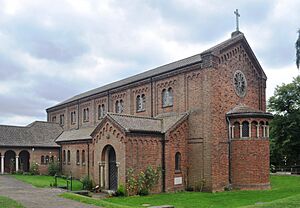St Francis of Assisi's Church, Bournville facts for kids
Quick facts for kids St Francis of Assisi's Church |
|
|---|---|

The church in August 2024
|
|
| 52°25′44″N 1°56′07″W / 52.4289°N 1.9354°W | |
| Denomination | Church of England |
| Churchmanship | Broad Church |
| Website | www.bournvilleparishchurch.org.uk |
| History | |
| Dedication | St. Francis of Assisi |
| Administration | |
| Parish | Bournville |
| Diocese | Birmingham |
| Province | Canterbury |
St Francis of Assisi's Church in Bournville is a special parish church that belongs to the Church of England. It is located in Bournville, a lovely part of Birmingham.
Contents
History of St Francis Church
The Bournville Village Trust set aside land for a church and a church hall way back in 1905. The church hall was built in 1913. Today, this hall is part of the local community center. The main church building was officially opened and blessed in 1925.
Who Designed the Church?
A talented architect named William Alexander Harvey designed the church building. The church's font, which is a basin used for baptisms, was given in 1984 to remember someone special. It is made from strong Portland stone and was created by the sculptor John Poole.
The Church Chapel
A smaller chapel inside the church was designed by Selby Clewer and built in 1966. It was a gift from Laurence and Joyce Cadbury. They gave it in memory of three of their children.
The Church Organ
The church's organ was built by a company called Nicholson & Co. from Worcester. The Cadbury Brothers gave this organ to the church. It was originally located in The Girls' Dining Room at the Bournville Works.
You can find more details about this organ on the National Pipe Organ Register website.
Current Status of the Church
St Francis of Assisi's Church has recently had a lot of important work done to it. This included getting a brand new roof and a modern lighting system. The church also improved its ramped access, making it easier for everyone to visit. The inside of the church was also redecorated.
The church is a Grade II listed building. This means it is a very important historical building that needs to be protected.
 | Jackie Robinson |
 | Jack Johnson |
 | Althea Gibson |
 | Arthur Ashe |
 | Muhammad Ali |

